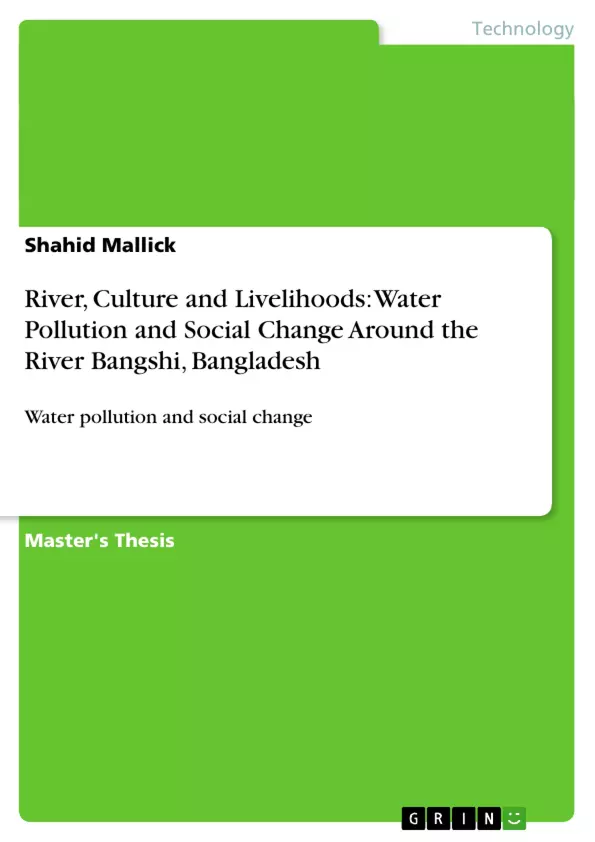Water is key to human survival, development progressions and success. However, the current trends of destruction of global fresh water source is alarming for sustainable development. The water use conflicts among different actors i.e. agriculture, industry and urbanization and pollution of surface/river water due to industrialization and other anthropogenic causes are too high in developing country.
The 238 kilometer long Bangshi River is one of the important tributaries of the Barhamaputra-Jamuna river system in Bangladesh and main common property resource for local people particularly those of Ghughudia. The Banghsi River is being threatened because of EPZ (a special economic zone with huge tax subsidies and many other facilities to attract foreign investors) and pollution of other local industries.
The concern in this study is to understand and explain how industrialization and its pollution to rivers induce social change and affects the environment, ecology and livelihoods around the River Banghsi.
Two broad questions were asked and discussed 1) What are the perceptions of different actors in regards to water pollution; and 2) How can they be mobilized to reclaim therights of the common people. The grounded theory approach and qualitative methods i.e. focus group discussions (FGD), in-depth individual interview and descriptive survey were conducted. In total of 47 people were involved, not counting three FGD. Among those 30 are from the Ghughudia village and rest are out side village. The representative stakeholders groups; fishing, farmer, small business, Goala/milkman and students are from Ghughudia and the owners of industry or their representatives, government officials, political leaders, media and civil society groups are from outside Ghughudia village.
Inhaltsverzeichnis (Table of Contents)
- Executive Summary
- Introduction
- Literature Review
- Methodology
- Research Design
- Study Area and Sampling
- Data Collection Techniques
- Data Analysis and Interpretation
- Findings and Discussions
- Perception of the Actors about Water Pollution
- Community Mobilization
- Environmental and Social Changes due to Industrialization
- Conclusion
- Recommendations
- Acknowledgement
- References
- Appendices
Zielsetzung und Themenschwerpunkte (Objectives and Key Themes)
This dissertation explores the impact of industrialization and pollution on the Bangshi River in Bangladesh, focusing on its effects on the livelihoods and social structures of the local community. The study seeks to understand the perceptions of different actors regarding water pollution and identify strategies for community mobilization to reclaim their rights. * **Industrialization and Environmental Degradation:** The study investigates the relationship between industrialization and the deterioration of the Bangshi River, analyzing the impact of pollution on the river's ecology and the livelihoods of local communities. * **Community Perceptions and Mobilization:** The study explores the perceptions of various stakeholder groups regarding water pollution and their potential for collective action to address the issue. * **Social Change and Traditional Livelihoods:** The study examines the social and cultural changes brought about by industrialization, particularly the impact on traditional fishing communities and agricultural practices. * **Government and Governance:** The research analyzes the role of the government in regulating industrial pollution and the challenges faced in implementing environmental regulations. * **Community Mobilization and Sustainability:** The study proposes strategies for sustainable community mobilization to address the issue of water pollution and promote sustainable development.Zusammenfassung der Kapitel (Chapter Summaries)
- Introduction: This chapter provides an overview of the study's context, outlining the significance of water resources for human survival and development, and highlighting the alarming trends of water pollution in developing countries. The chapter focuses on the Bangshi River in Bangladesh and its importance as a common property resource for the local community.
- Literature Review: This chapter examines relevant literature on water pollution, industrialization, community mobilization, and the socio-economic impact of environmental degradation. It provides a theoretical framework for the study and establishes a foundation for analyzing the research findings.
- Methodology: This chapter details the research design, including the grounded theory approach and qualitative research methods used to gather data. It describes the study area, sampling methods, data collection techniques, and data analysis and interpretation strategies.
- Findings and Discussions: This chapter presents the main findings of the research, focusing on the perceptions of different actors regarding water pollution, the challenges and opportunities for community mobilization, and the environmental and social changes induced by industrialization.
Schlüsselwörter (Keywords)
This dissertation examines the complex interplay of industrialization, water pollution, community mobilization, and social change in the context of the Bangshi River in Bangladesh. The study focuses on key concepts like industrial pollution, environmental degradation, traditional livelihoods, community empowerment, and sustainable development. It explores the perceptions and mobilization of various stakeholder groups, including fishing communities, farmers, small businesses, and government officials, in addressing the challenges posed by industrial pollution. The study utilizes a grounded theory approach and qualitative research methods, drawing on focus group discussions, in-depth interviews, and descriptive surveys to understand the complex social and environmental dynamics at play.- Citar trabajo
- Shahid Mallick (Autor), 2012, River, Culture and Livelihoods: Water Pollution and Social Change Around the River Bangshi, Bangladesh, Múnich, GRIN Verlag, https://www.grin.com/document/208986



